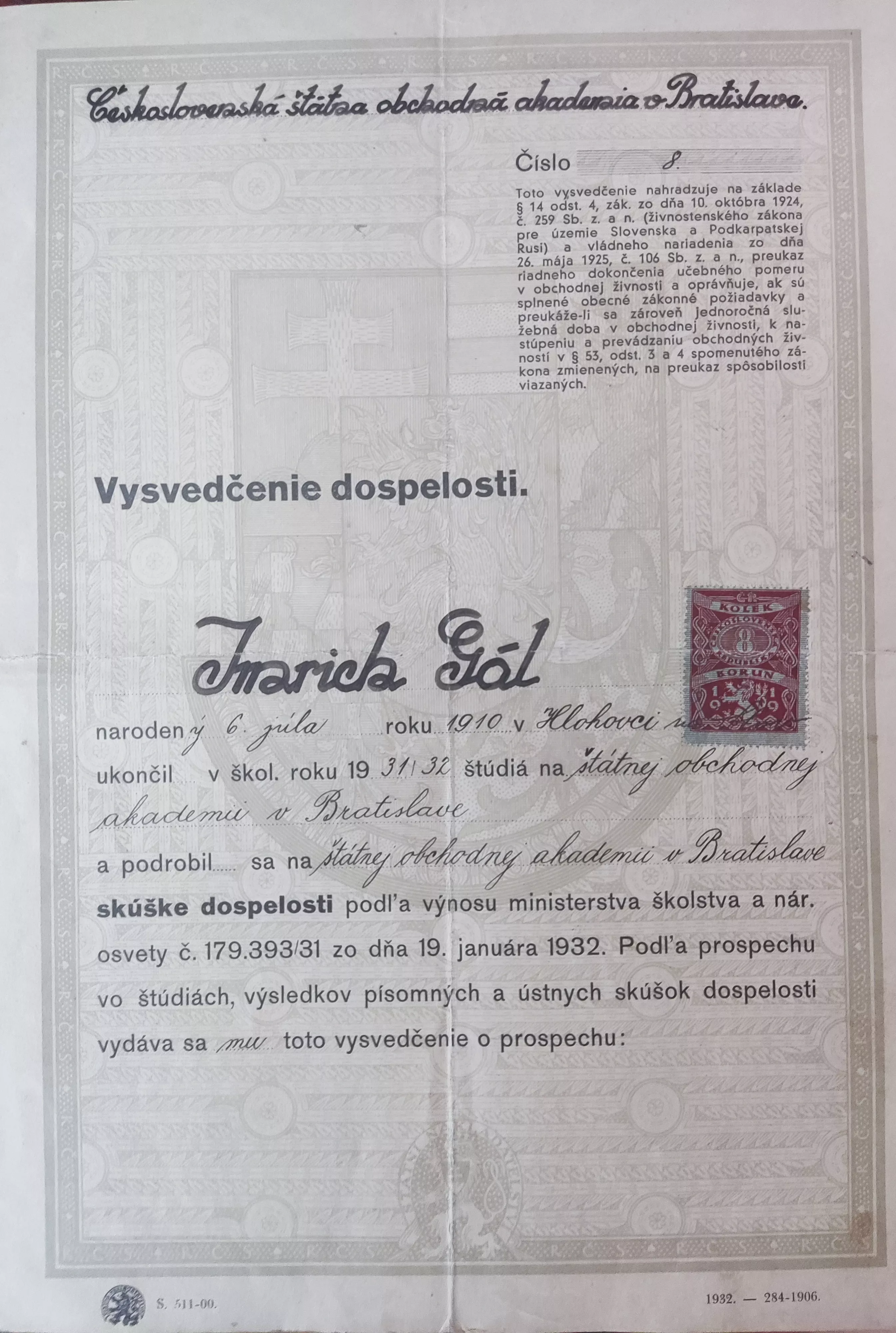
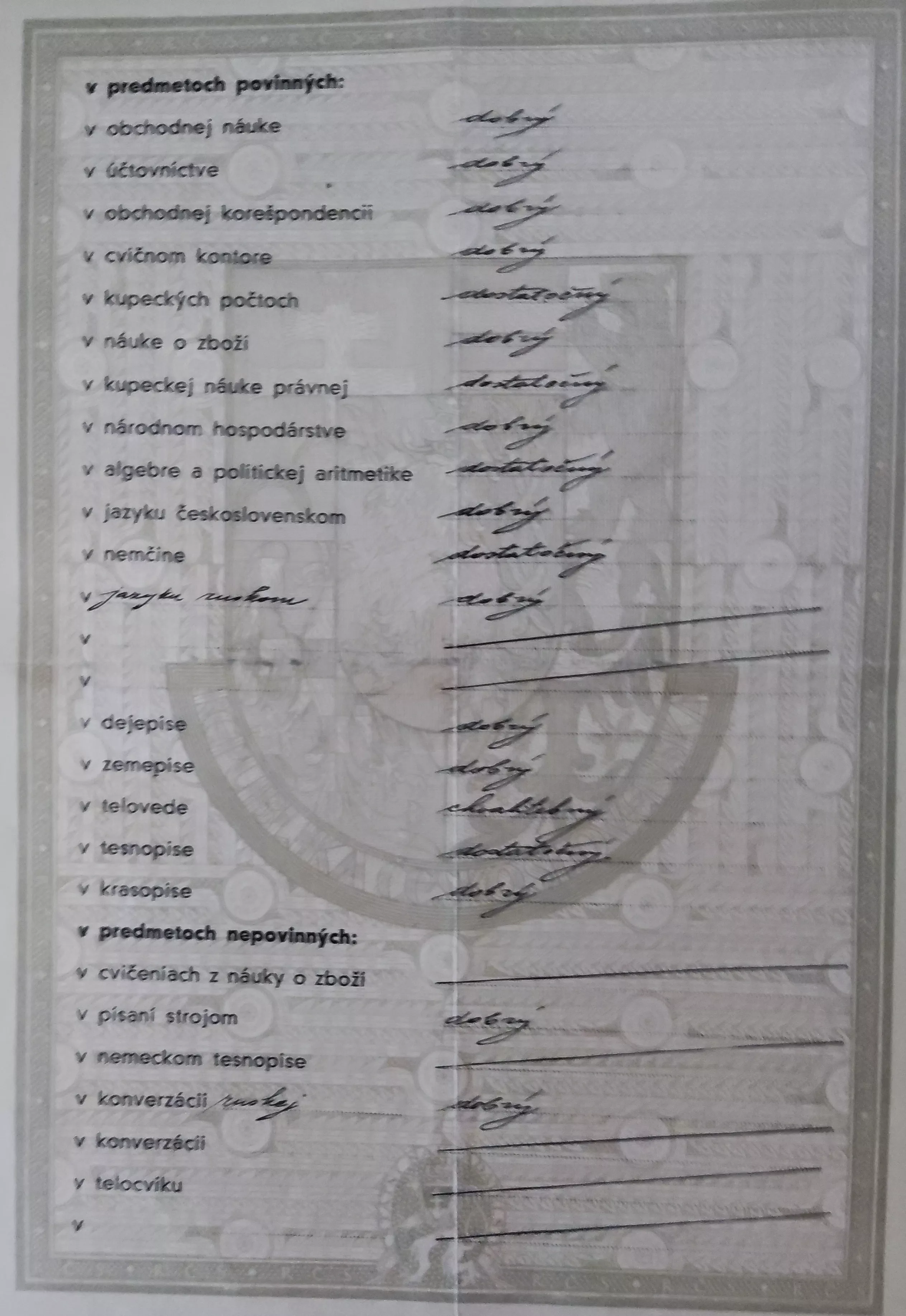
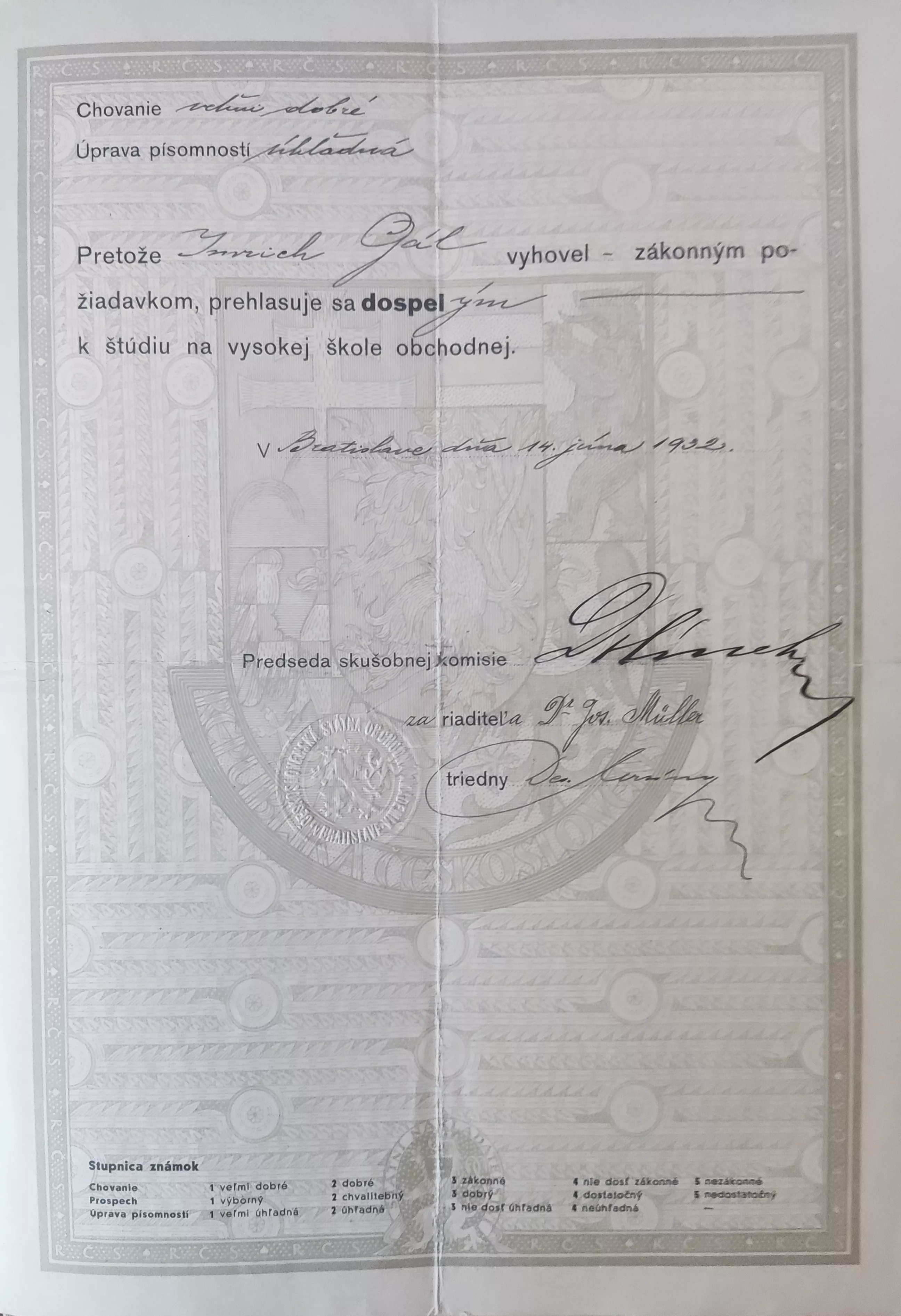
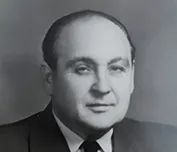
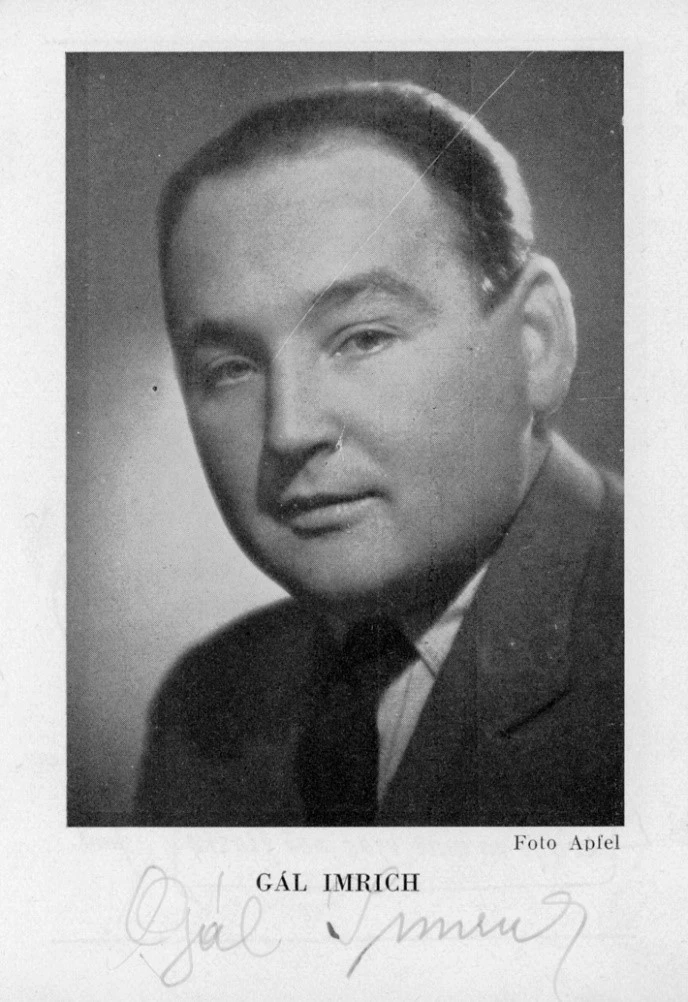
Imrich Gál sang a lyric baritone that was warm, soft and velvety, with a clear and understandable declamation and ability to sing over (not shout) the orchestra fortissimo. His repertoire was full of Italian operas, especially those by Giuseppe Verdi (he sang ten roles) and Giacomo Puccini (eight roles), so a quarter of his repertoire was by these two composers. He played five roles in the operas by Bedřich Smetana, four roles in Antonín Dvořák, as well as in the works by Wolfgang Amadeus Mozart (also four roles). According to available records he sang 70 roles, of which 67 were operatic and three were operetta (the role of Koloman Župan in The Gypsy Baron by J. Strauss Jr., the role of Michal in Gypsy Love by Franz Lehár and the role of The Majordomo in Boccaccio by Franz von Suppé), some of them were significant, others less so. In total, he recorded 88 role studies, as he sang on two stages with different directors and at different times. He had the most role studies as Krušina, the father of the "bartered bride" in B. Smetana's opera of the same name, in the years 1940, 1949, 1953 and 1961. In addition, he sang a number of folk and operetta songs, which were also recorded by the then Czechoslovak Radio. Unfortunately, many of their recordings were destroyed during the Danube floodings in 1965, when the water reached Jakubovo námestie (then Leninove námestie), where the Czechoslovak Radio building with its archive was located. Many of the recordings were irreparably damaged.
The few surviving private records clearly indicate the harmony, compactness and persuasiveness of his voice, as evident from perhaps the most famous aria ever written for baritone from the opera Rigoletto in I cortigiani vil razza dannata (The courtiers, the vile, accursed race), or in Tosca´ s Baron Scarpia in Il balen del suo sorriso (I still see her look) or in Faust and Margaret in the aria Avant de quitter ces lieux (Before leaving these places). Probably the only officially existing recording of his voice on vinyl mono LP is the Rigoletto´s aria I cortigiani vil razza dannata on the OPUS double disc released in 1981 as From the History of Opera.
As he used to say, he grew up on a sugar factory courtyard in Trnava, where his father, also Imrich, “cooked” sugar. In his youth, Imrich Gál II. was a quite successful swimmer and water polo player, to what he probably owed his enormous lung capacity, which he later used in the opera. In the 1930s, he swam the 100 m breaststroke in the first Czechoslovak Republic in the best time at the time, which would not be enough to place in regional competitions today. He played water polo for ten years and trained swimmers. The swimming probably had a significant impact on his musculature, especially his chest – its circumference was almost 140 cm, which was truly phenomenal given his height of 170 cm. Arnold Schwarzenneger was 152 cm at the time of his greatest fame. However, this was not always an advantage, both of them had to have their shirts and suits custom made.
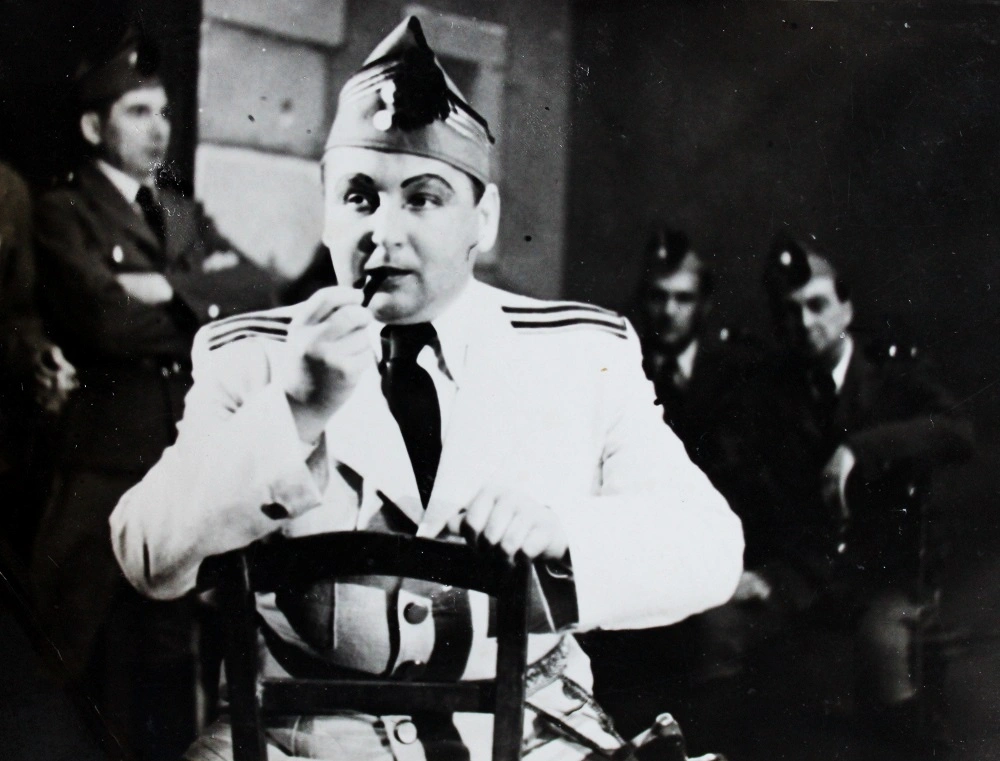



Imrich Gál was born in Hlohovec on July 6, 1910. He had three siblings: Mária, a little over a year older than him, lived to the respectable age of 93. Brother Alexander was five years younger, dying prematurely at the age of 36. The youngest was his sister Anna, 9 years younger than Imrich. She died very young at the age of 48 in Sydney, Australia. The singer's father was also Imrich, and his mother was called Anna.
He completed his primary education at the folk school in Hlohovec from 1916 to 1921. He then enrolled in the high school in Hlohovec, where he was a student from 1921 to 1926. He attended the Business Academy in Bratislava from 1926 and passed his final exam in 1932. While studying at the Business Academy, he performed in the school choir. The conductor of the ensemble noticed his extraordinary voice and advised him to apply to the Music and Drama Academy.
In the years 1932 – 1934, he completed his military service with the 39th Infantry Regiment in Bratislava in an unspecified officer rank outside of active service. As part of some military manoeuvres and transfers, he was the commander of a truck that had an accident somewhere near City of Trenčín. He injured his head in the accident, was in a coma for some time and in the hospital for several months. A scar on his forehead wouldn't be the worst. Until his death, he was left with a buzzing sound in his head, a big nuisance for anyone not mentioning an opera singer. The scar is also evident in the artistic portrait by Pavel Méheš where he was portrayed as Rigoletto.
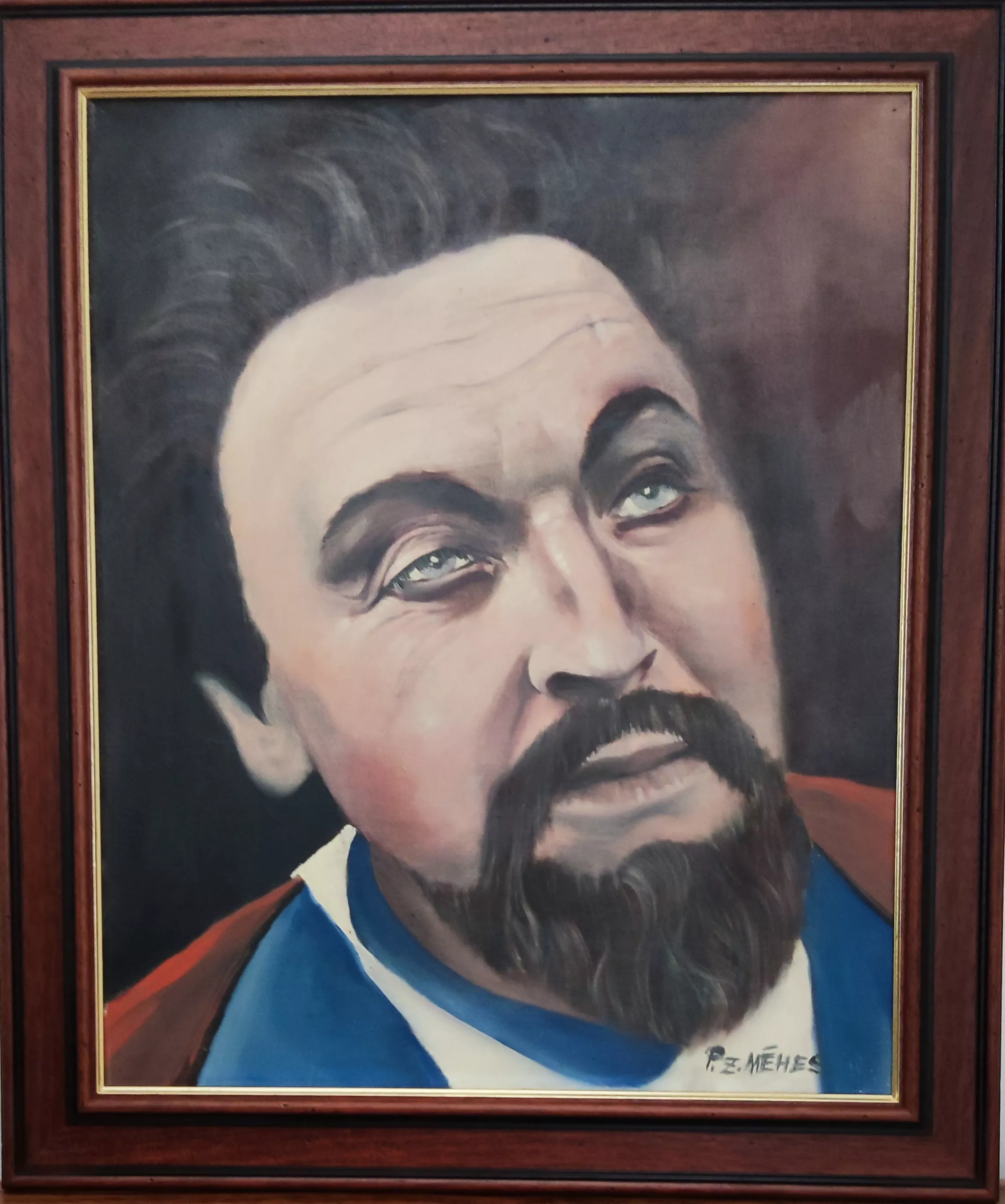
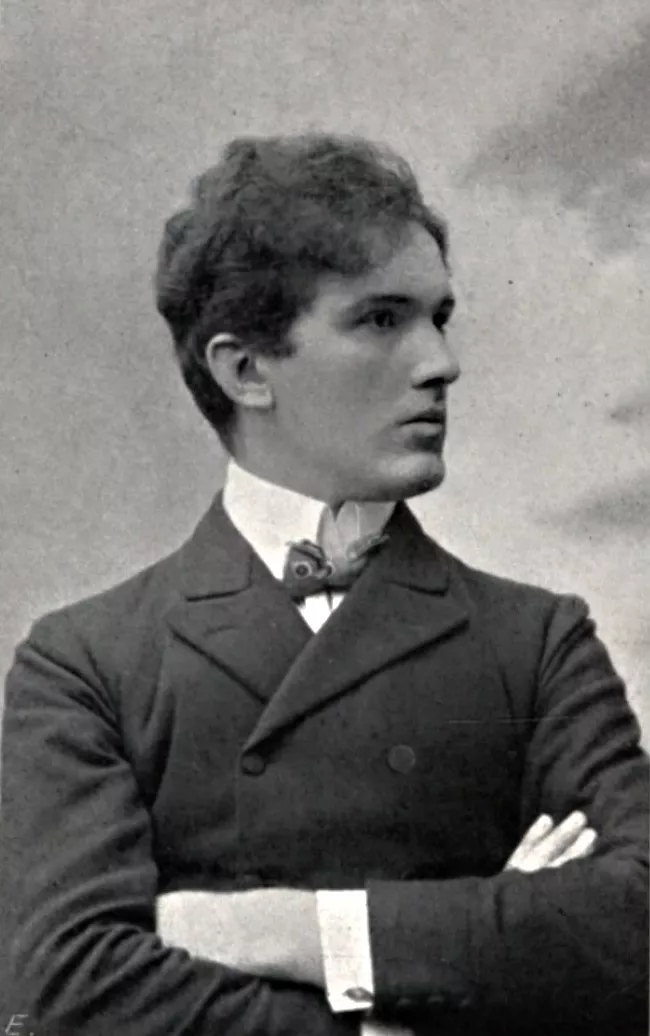
From 1934 to 1939, he worked as an accountant in the Department of the Ministry of Education and Enlightenment. In addition to his work as a ministerial accountant, he attended the above-mentioned Academy of Music and Drama in Bratislava attending the opera singing classes with Prof. Josef Egem1 from 1933. He completed his studies there in 1937. In the same year, he performed at the Chamber Music Festival in Trenčianske Teplice.
Originally, his vocal potential was not considered a baritone and but a bass. Over time, it became clear that (lyric) baritone was the most natural position for his voice. However, in his later professional life, he "wandered" into the voices originally written for bass. From contemporary materials, it is clear this happened more than twenty times, and three were originally intended by the composers for bass-baritone. The said points to a wide voice range.
1 Prof. J. Egem worked it the Academy in the period 1921 till 1939. Among others, his students were: Helena Bartošová, Margita Česányiová, (Anna Hrušovská and Mária Kišoňová-Hubová taking private lessons), Zita Hudcová-Frešová, Dita Gabajová, Janka Gabčová, Štefan Hoza, and Lida Pátková, Vladimír Clementis´ spouse. https://noveslovo.eu/archiv/vyznamny-vklad-do-nasej-kultury/
After graduating from singing studies, he had the opportunity to present himself to the musical public in several roles as a non-contracted member of the Slovak National Theatre (SND) Opera. His first appearance2 was on 29th December 1938 as an Old singer in the first Slovak opera Detvan by V. Figuš Bystrý3, later as Valentín in Faust and Margarita by Ch. Gounod, or John Porson in Stella by L. Holoubek.
2 However, period materials (the performance posters) listed him under the name Jozef Gál, and not only on this occasion.
3 Detvan by V. Figuš Bystrý was the first "national" Slovak opera written in 1926 based on the poem Detvan by A. Sládkovič. Opera Kováč Wieland (Blacksmith Wieland) by Ján Levoslav Bella (written in 1880–1890) was first performed at the SND on 28th April 1926, but given the theme and origin of the opera, there were almost no pure Slovak elements, except for the fact that J. L. Bella was Slovak. To this day, the controversy over whether Kováč Wieland was truly the first Slovak opera has not been settled.
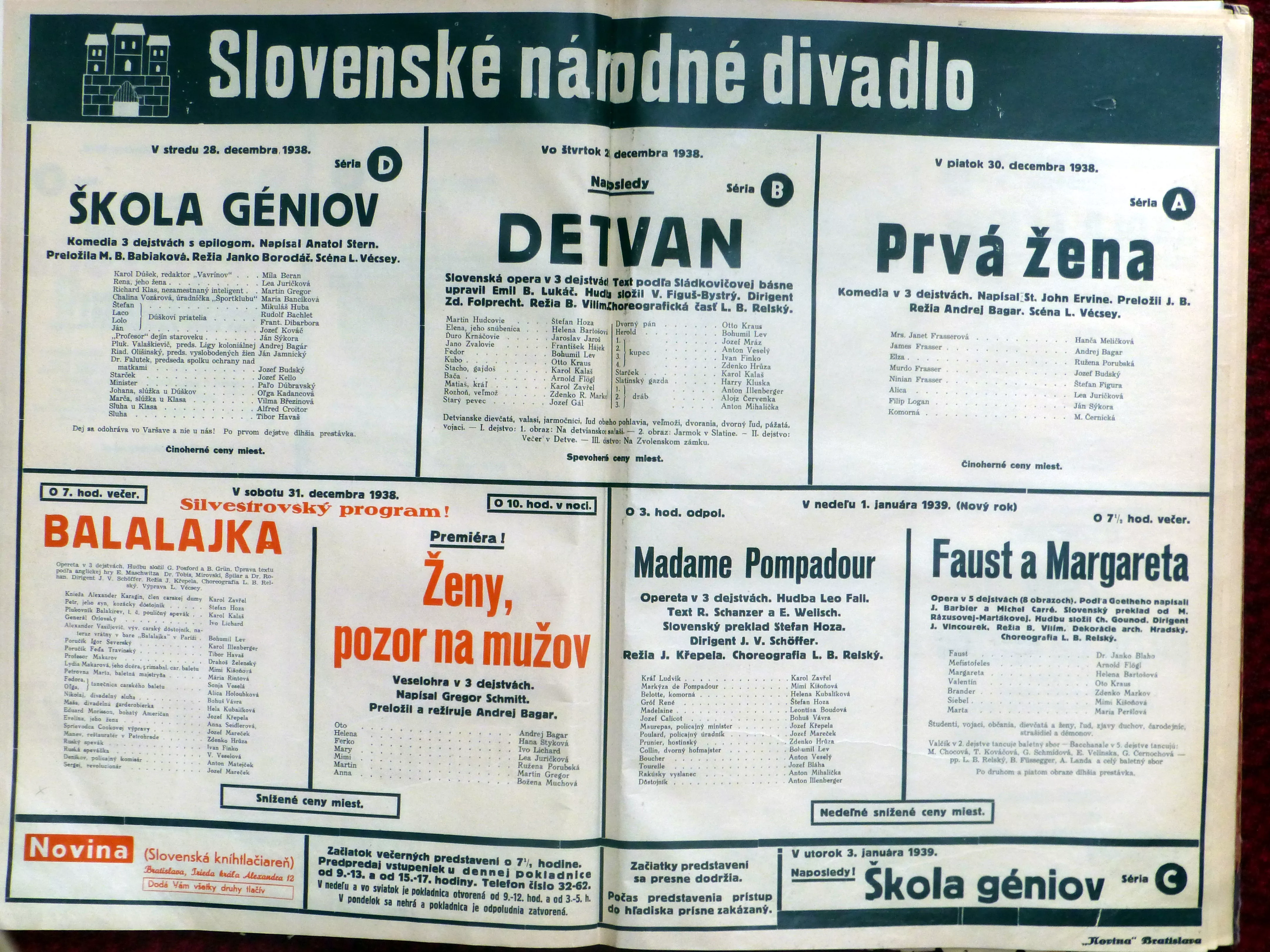
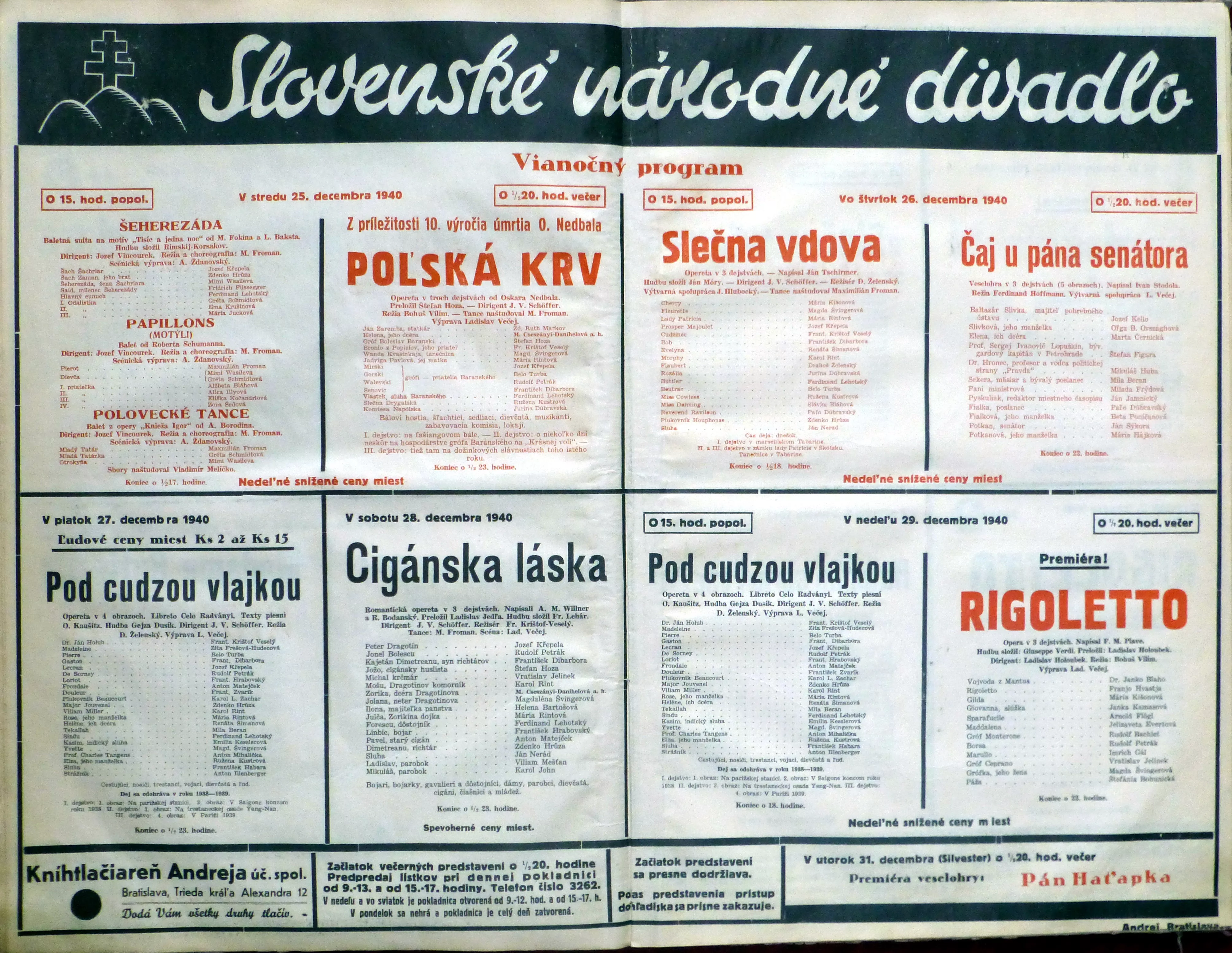
He began his career as a SND soloist on 1st September 1939; he premiered in Gingerbread House (known also as Hansel and Gretel) by E. Humperdinck as The Father on 16th September of the same year. By the end of World War II, he had sung another 28 roles. Some of them were characters from important operas, such as Marullo in Rigoletto by G. Verdi and Count Luna in Il Trovatore by the same author, Morales in Carmen by Ch. Gounod, or Schaunard in La Bohème by G. Puccini. However, there were also operas that have been forgotten in the 21st century and are opera curiosities today: Salammbò by W. Stojanov, where he sang Magdassan, The Vixen Pipuška by Š. Hoza and E. Doležal in the role of The Forester, Peer Gynt by W. Egko, in which he was The Blacksmith, Svitanie (Sunrise) by L. Holoubek in the role of Suroviak, or Mignon by A. Thomas when he was Jarno. He also had strong competition in the Slovenian Franjo Hvastija, who began singing with the SND in 1940. In the magazine Elán, issue 6 of February 1942, musicologist, pedagogue and founder of Slovak musical historiography Konštantín Hudec wrote that Imrich Gál "...the role of Count Luna, which he alternated with F. Hvastija in the first reprise, suited him exceptionally well and the high positions of the aria "Stále zriem jej pohľad" (Il balen del suo sorriso) sounded delicious and clear by Gál." Emil Schütz, another barytone, also proved to be a capable competitor.
He sang 33 roles at the SND until 1947. At that time, he was persuaded to transfer to the National Theatre in Košice (ND)4 by Janko Borodáč5, who was in Košice since 1945. Their paths, which initially crossed at the SND in Bratislava, were reunited.
4 In 1924, the East Slovak National Theatre (VND) was established in Košice. From 1937, the VND functioned as a "branch" of the Bratislava SND. In 1938, the City of Košice was ceded to Hungary based on the First Vienna Arbitration and the VND ceased to exist. The VND was reopened in 1945. From the 1946 -1947 season, it was called the National Theatre (ND) in Košice, in 1955 it was renamed the State Theatre (ŠD) Košice and in 2023 the National Theatre Košice.
5 In this case, as in many others, the politics mixed with art and the wider social context. Andrej Bagar (the new intendant and director of the SND after 1945, who had been an active member of the Communist Party since 1938 and a member of the Central Committee of the Slovak Communist Party since 1954) dismissed J. Borodáč from his position at SND in 1945 and sent him to Košice to build a renewed ND. This was (probably) a reaction to J. Borodáč's activities during the Slovak State, when he was (willingly or unwillingly) under the influence of the political situation of the time. His detractors used his works against him such as Chlapci na stráži (Boys on guard) or Juro Jánošík, unsuccessful adaptations of Slovak classical plays, like Kocúrkovo by Ján Chalúpka or Incognito and Drotár (Tinker) by Ján Palárik, which came across as marketing for the wartime Slovak State. It was also a confrontation reflecting the political reality of the old era with the new, that is, the fascist versus communist perception of the world. Paradoxically, A. Bagar was J. Borodáč´s colleague when they joined the Promotional Drama Ensemble of the SND in August 1921 known as Marška (Travellers) that literally travelled around Slovakia because it did not have a permanent "stone" stage. J. Borodáč worked in Košice with his wife for eight years (1945-1953).
His work at the ND in Košice was certainly significant and successful for the singer. During his relatively short time there (1947–1952), he studied and performed 25 characters, which were the main characters in half of the individual operas he performed at the ND. These were primarily:
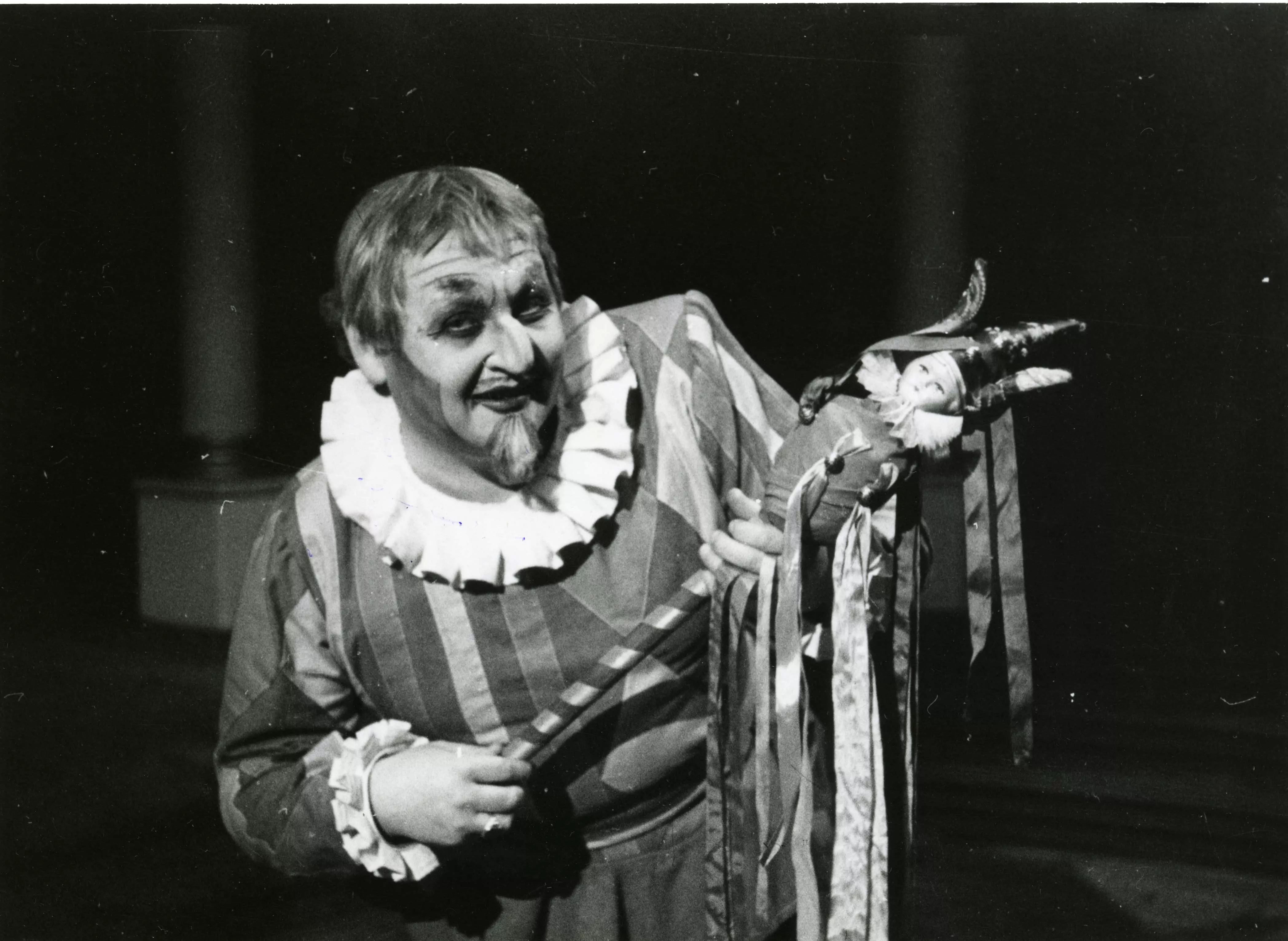
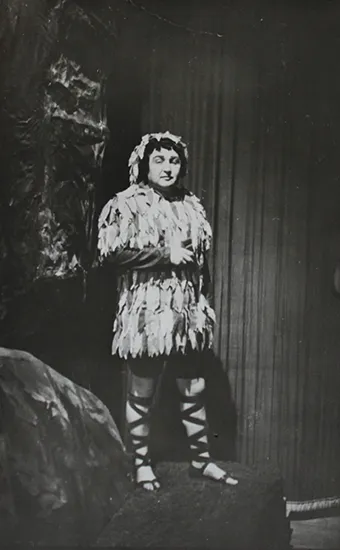
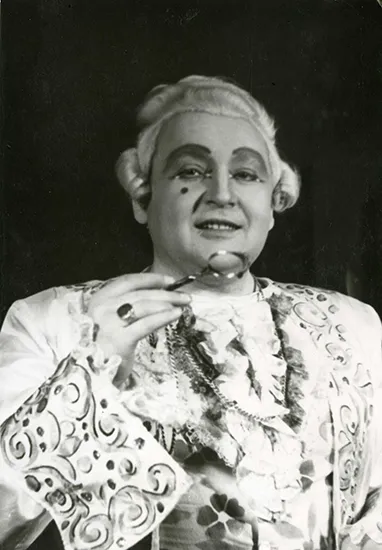
7 A Zaporozhian Cossack Beyond the Danube by Semyon Hulak-Artemovsky was the first Ukrainian opera. It premiered at the Mariinsky Theatre in St. Petersburg in 1863.
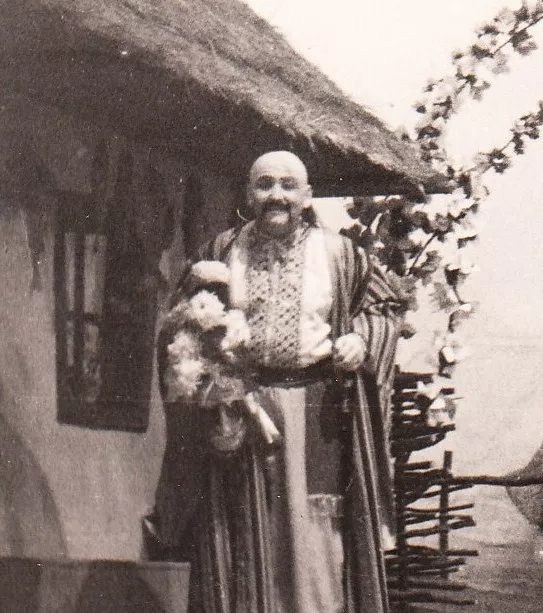
I. Gál also sang other characters in the ND than those mentioned above. These were, for example, The Hunter in Rusalka and Vávra in Hard Heads by Antonín Dvořák, Tomeš in Hubička, Krušina in The Bartered Bride as well as Kalina in The Secret by Bedřich Smetana, Marcel in Bohème by Giacomo Puccini, Januš of Odrovonž in Halka by Stanisław Moniuszko, Mizigír in Snow White by N. Rimsky-Korsakov, or Shchelkalov in Boris Godunov by Modest Mussorgsky.
After returning to the SND in 1953, when his steps were once again inspired by Janko Borodáč, he found himself in a more difficult position than before leaving for Košice, as other high-quality baritone players such as Bohuš Hanák, Juraj Wiedermann and Juraj Martvoň had joined the ensemble, in addition to his former colleagues. In addition to the aforementioned, Franjo Hvastija, an exceptional baritone from Slovenia who had come to the SND in 1940, was still present. So, the competition was very strong.
But not only the competition within the opera ensemble was intense. His career was also not helped by other matters that had nothing to do with art or his talent, but fundamentally influenced it, although not visibly and directly. His father-in-law was sentenced to several years in a staged trial in the late fifties for subverting the state economy. He served his sentence in prison in the uranium mines in Jáchymov. Also, in the eyes of the opera management at the time, the fact that, although not fanatically religious, he went to the church next to the opera building (Church of the Assumption of the Virgin Mary - Notre Dame) before each performance to "ask" for a successful performance. He did it out of a superstition rather than real faith. That did not help him, naturally. Sitting in a church was not very "popular" in those days and the opera management reproached him several times (composer Šimon Jurovský was the artistic director of the SND opera in the years 1956 – 1963 and belonged to so called “engaged artists8).
8 https://hc.sk/o-slovenskej-hudbe/osobnost-detail/967-jurovsky-simon
Here too, it turned out that the art is not immune to the politics.
„Engaged artist “denoted, at the given time, an artist who succumbed to conformism, e. g. who purposefully built an artistic and personal position in the context of the then social along political events finally submitting to these pressures. The spirit of the times, the politicisation of private lives, hidden animosity, and the forced worship of ideological, ethical and moral cripples left a deep mark on the social atmosphere and everyday life of all those who were not on the right side. That all was clear in Š. Jurovsky’s case as many others at that time.
In his second stint at the SND, he performed in more than 30 roles, one of which was a spoken one – the role of The Couchman (Kočiš) in the opera The Condemnation of Lukullus by Paul Dessau (premiered in 1962). Some of the roles, of course, overlapped with those sung during his first stint at the SND until 1947, or with those performed at the ND in Košice. Later, the step of returning to Bratislava proved to be ill-advised, it did not contribute to his professional advancement, as the competitive environment was overcrowded and so he received fewer opportunities and in less significant roles than in Košice. In addition, there were gradually accumulating health problems limiting his presence on the stage. He missed the 1962/63 season completely after his third heart attack. His last year as an opera soloist was the following season, 1963/64, when he appeared as Silvano in Verdi's Un ballo in maschera and The Judge in Marta by F von Flotow. His health prevented him from performing further, and in 1964 he ended his active singing career.
At the SND after 1953, he sang roles in important operas, namely: Tomeš in Hubička, Krušina in The Bartered Bride and Radovan in Libuša by Bedřich Smetana; Giorgio Germont in La traviata, Marullo in Rigoletto, Montano in Otello, and Silvano in Un ballo maschera by Giuseppe Verdi. In the works by Antonín Dvořák were: The Hunter in Rusalka and The Devil the Doorman and The Marshal in The Devil and Kate. In operas by Giacomo Puccini, he sang Schnauard in the renewed premiere of La bohème, Scharples in Madama Butterfly, Sciarrone in Tosca, The Innkeeper in Manon Lescaut. He also sang Shchelkalov in Boris Godunov by Modest Mussorgsky, Antonio in The Marriage of Figaro by Wolfgang Amadeus Mozart, Valentin in Faust and Margarita by Charles Gounod. In the works of Slovak authors, there were two adaptations of Mikuš in Juro Jánošík by Ján Cikker (1954 and 1961) and The Elder in Svätopluk by Eugen Suchoň.
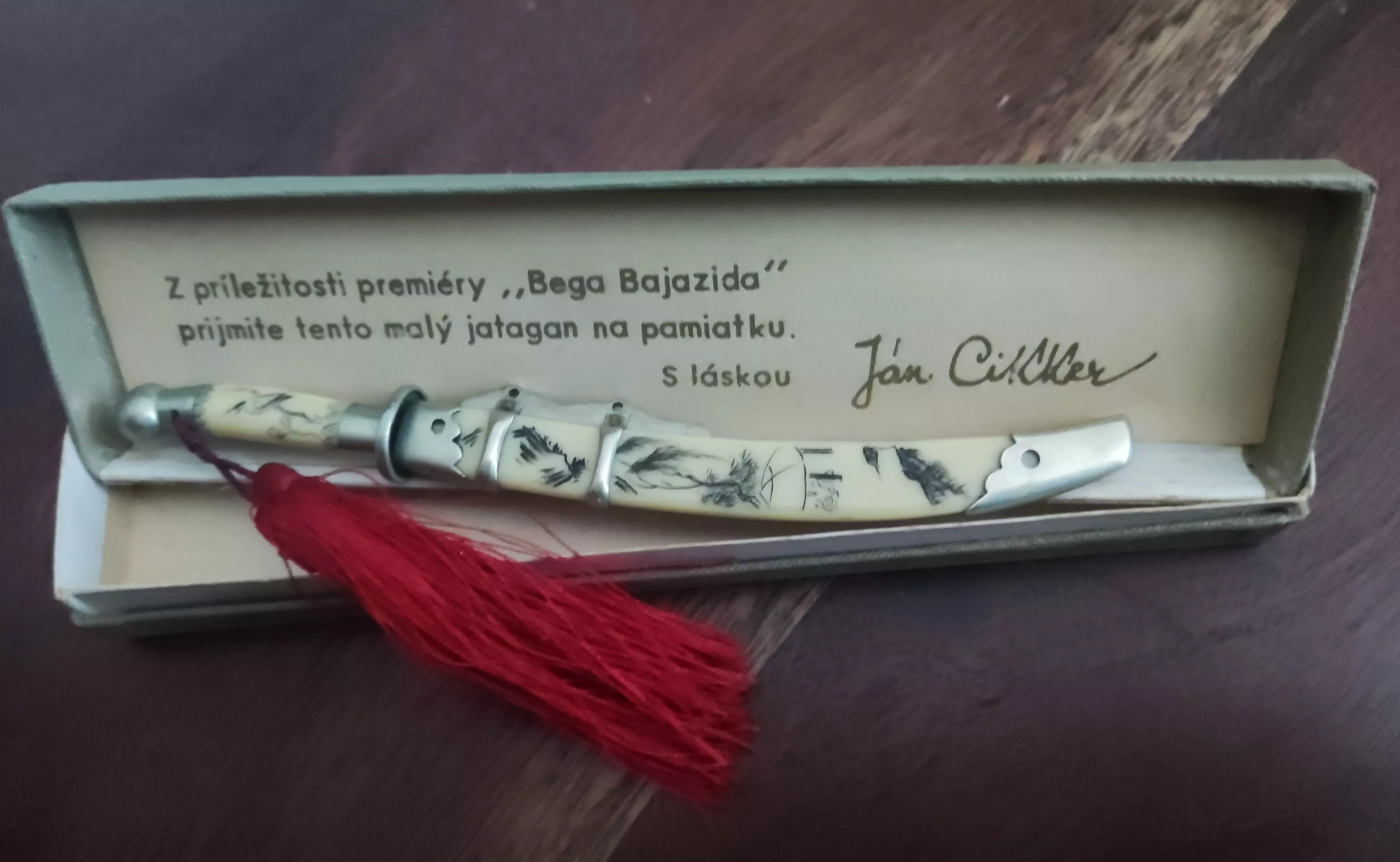
Similar to Košice, he was part of works that are often on the fringes of opera houses' interest in today's context. These were: Dogheads by Karel Kovařic (Kosh), Into the Storm by Tikhon Khrennikov (Tchirikin), Beg Bajazid by Ján Cikker9 (Pasha Ibrahim), Fra Diavolo by Daniel Auber (Matheo), Hansel and Gretel (The Gingerbread House) by Engelbert Humperdinck (The Father), Zuzana Vojířová by Jiří Pauer (Adam from Hradec), Sadko by Nikolai Rimsky-Korsakov (The Venetian Guest), How the Egg Went on a Wandering Journey by Miloslav Kořínek (The Crayfish), The Story of a true Human by Sergei Prokofiev (The Second Surgeon), or Marta by Friedrich von Flotow (The Judge).
9 The composer presented each opera participant with a commemorative miniature ivory scimitar.
In the years 1956 – 1965, he was able to put his experience to good use as an external vocal lecturer at the State Conservatory in Bratislava. He also commuted to Komárno for some time, where he taught singing at the Hungarian Regional Theatre. He prepared the baritone František Caban (he performed at the Slovak National Theatre from 1983 to 1991) and the tenor Jozef Ábel (he performed at the Slovak National Theatre from 1982 to 2004) for their stage performances.
In addition to the aforementioned, he had students who later became successful actors. Singing was also a study subject for future actors, although not concluded with an exam, but "only" with a credit. Among others, he taught Michal Dočolomanský, whose performance, especially in the musical Maľované na skle (Painted on Glass), became a jewel among DPOH performances.10
An amusing episode in the family of the professor became legendary how Mišisko (the nickname he used to call himself) got his credit for singing: M. Dočolomanský knocked on the door of his professor's apartment one Saturday afternoon. The landlady opened the door and said: "What do you want?" "I'm looking for the professor. Is he home?" "Yes, he is. And who are you?" "Just tell him that Mišisko is here." "But he's in the bathtub, taking a bath." "But I really need to talk to him." "Okay, I'll ask him." Mrs. Gálová said to her husband in the bathroom: "There's some Mišisko here, and he wants to talk to you." "Oh, it's Dočolomanský, just call him in." Dočolomanský entered the bathroom, where his teacher was in a bathtub full of warm water. "So, Mišisko, what would you like?" "Professor, I need that credit. Would you sign the index for me?" "Well, what can I do with you? Turn around and stick your back out." The professor stood up in the bathtub, Mišisko stuck his back out, and the index was signed. This is how the future star of the acting ensemble received his singing credit from the bathtub.
Imrich Gál undoubtedly had talent and a good voice, but he did not achieve a stellar career, even though he had the technical ability to achieve that. Once in the 1940s, an impresario from Milan's La Scala allegedly visited him and lured him to Italy to study. He was trying to convince him that if he came to Milan and studied and improved his skills, he was guaranteeing him the performances at the Metropolitan Opera in New York within two years.
10 Maľované na skle (Painted on Glass) with M. Dočolomanský recorded 648 performances; https://sk.wikipedia.org/wiki/Na_skle_ma%C4%BEovan%C3%A9
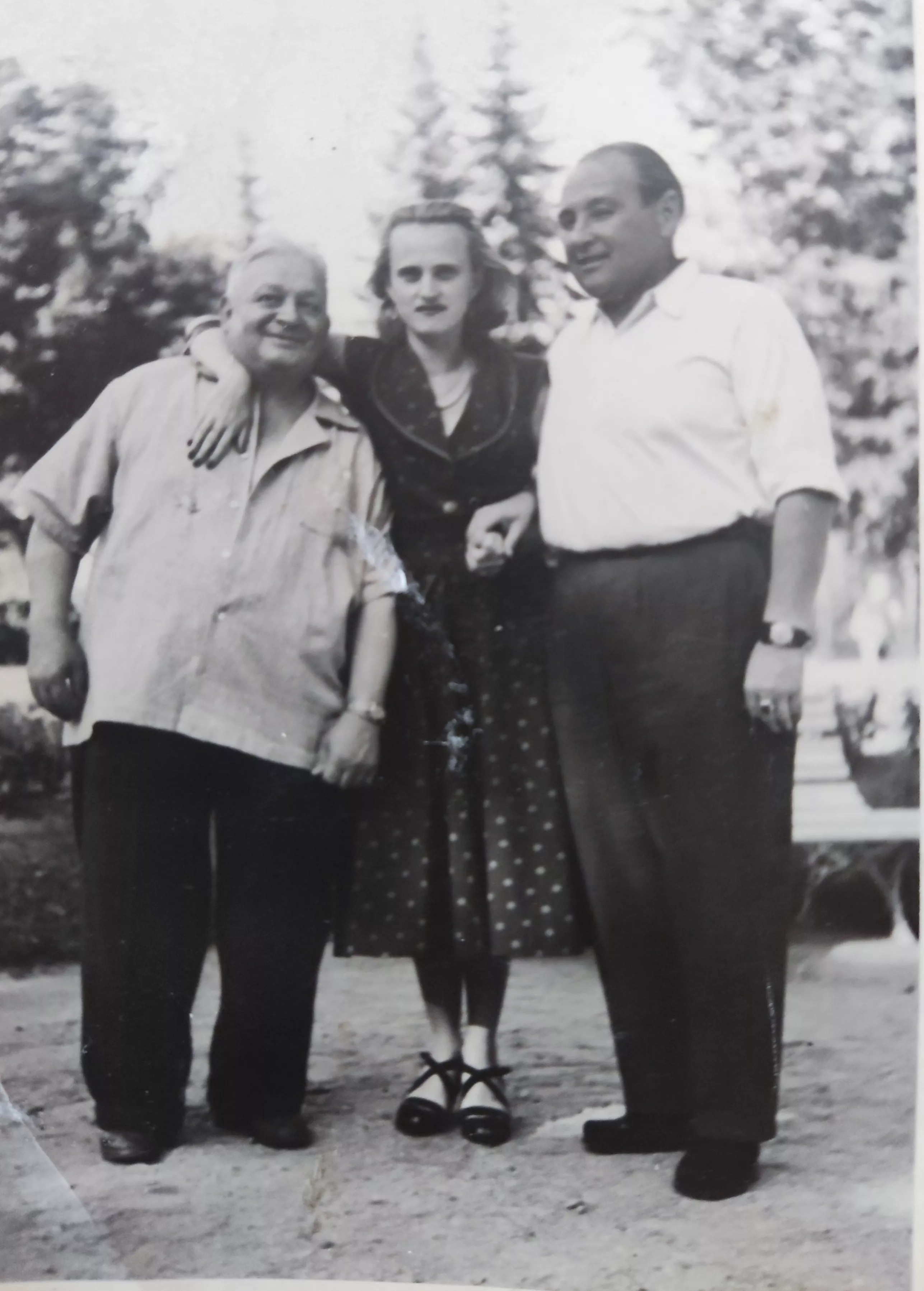
However, the singer did not want to leave his country, his parents, and his friends. In essence, he was not very assertive and eager for a career. For the same reason, while still in Košice, he refused an offer to take a permanent position at the State Opera in Prague11 .
He did not want to leave his young wife Dobroslava (* 1926 - † 2010), whom he had met in Košice.12
He made a choice, but not for the benefit of his professional advancement. He was unable to capitalise on his unique voice. There was a story that once, during a performance of La Traviata in Košice, one of the regular operagoers was brought to the Theatre on a stretcher. When the Theatre employees asked what it meant, she replied that she was at the end of her life and wanted to hear Imrich Gál sing Giorgio Germont one more time before she died. Today, a situation that is quite inconceivable. The quality of Imrich Gál's voice can be compared to the greats of the baritone of that time, although this may seem as exaggeration. The difference between them was that while they had the opportunity to develop, Imrich Gál voluntarily gave up this opportunity. After the Iron Curtain was erected, thoughts about foreign engagements became irrelevant. The baritone giants of that time Ettore Bastianini, Guiseppe Taddei, Carlo Tagliabue and Tito Gobbi missed on their possible competitor without even realising it.
Imrich Gál said goodbye to this world on February 9th, 1977. His funeral in the crematorium in Lamač filled the entire crematorium hall, where well over a hundred people were crowded. Mikuláš Huba, famous actor and theatrical veteran (the then SND Drama Theatre director) said goodbye to him on behalf of the Theatre. The singing colleagues forgot somehow. In the back corner, actor Martin Gregor, his compatriot from Trnava (originally named Martin Guttman) cried quietly, whom Imriško (as he called him) hid in his shop in Trnava from other "benevolent fellow citizens" dressed in brown during the time of the Slovak State. Martin Gregor said: "And why shouldn't I cry, today we are burying the man who saved me." It must be said here that Martin Gregor was helped by several people, not just Imriško.
Today, in the singers´ heaven, everyone from their era can recall the bygone glory of bel canto at the SND, which will never be repeated. It may be a certain consolation that in the virtual world of the web one can find examples of their mastery. The world of opera is beautifully fascinating and soul-uplifting.
11 He sang in 10 performances https://archiv.narodni-divadlo.cz/umelec/17626/seznam-predstaveni
12 Dobroslava and Imrich Gál had two sons: Peter (*1950 - †2012) and Imrich (*1956 - )